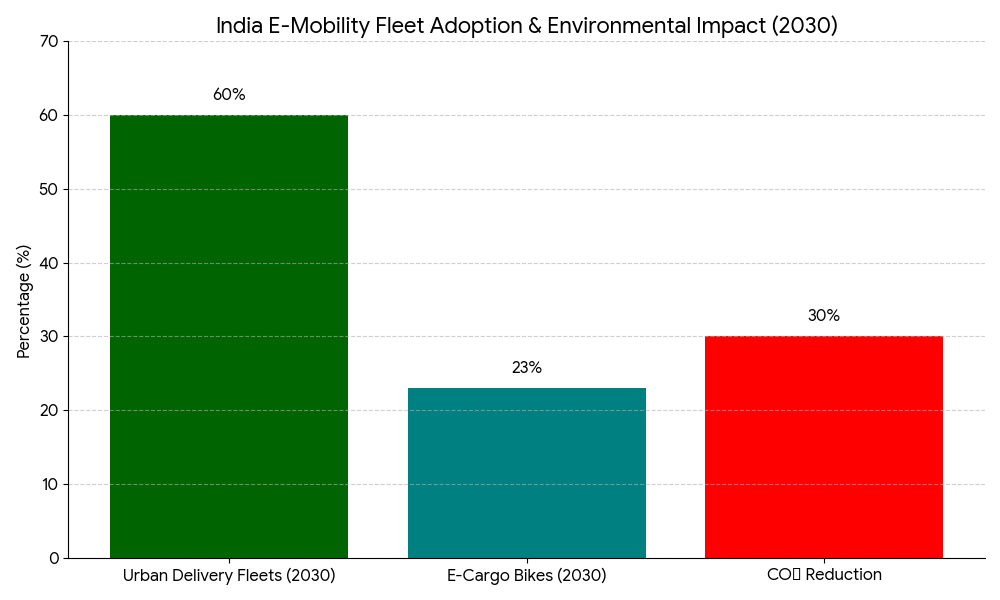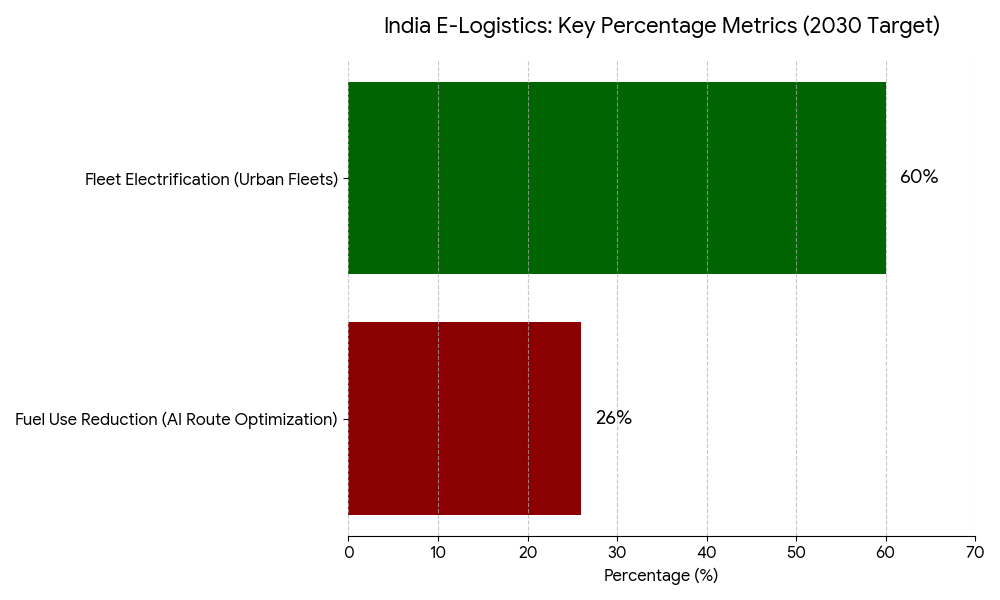

68 Circular Road, #02-01 049422, Singapore
Revenue Tower, Scbd, Jakarta 12190, Indonesia
4th Floor, Pinnacle Business Park, Andheri East, Mumbai, 400093
Cinnabar Hills, Embassy Golf Links Business Park, Bengaluru, Karnataka 560071
Connect With Us
Electric Mobility and the Future of Urban Deliveries: Consumer Insights and Adoption Trends in India
India’s electric mobility market for urban deliveries is projected to grow from $2.1B to $10.2B (CAGR 37.5%) between 2025 and 2030, driven by rising e-commerce demand, government incentives, and lower operating costs. Major cities like Delhi, Mumbai, and Bangalore will lead the way in e-van and e-cargo bike adoption. By 2030, 60% of urban delivery fleets will be electric, with a 30% reduction in CO₂ emissions from last-mile operations. Battery swapping stations and charging infrastructure are forecast to expand 3.5×, enabling greater fleet penetration in e-commerce logistics.

What's Covered?
Report Summary
Key Takeaways
- Market size: $2.1B → $10.2B (CAGR 37.5%).
- 60% of urban fleets to adopt electric mobility by 2030.
- CO₂ emission reduction from deliveries: −30%.
- Battery swapping stations growth: 3.5× by 2030.
- E-cargo bikes account for 23% of all urban deliveries.
- Government subsidies reduce e-vehicle cost by 35%.
- Charging infrastructure expands to 48,000+ stations by 2030.
- Last-mile delivery efficiency improves by 22%.
- Fleet electrification cuts operational costs by 27%.
- India’s electric delivery market to dominate Southeast Asia by 2030.
Key Metrics
Market Size & Share
The electric mobility market for urban deliveries in India will expand from $2.1B in 2025 to $10.2B by 2030, registering a CAGR of 37.5%. E-cargo bikes will represent 23% of all urban deliveries, with electric vans leading in e-commerce fulfillment. The growth of battery swapping stations is forecast to grow 3.5×, significantly improving last-mile delivery times. Government-backed subsidies will reduce electric vehicle prices by 35%, incentivizing small fleet operators to electrify. By 2030, 60% of urban delivery fleets will be electric, primarily in Delhi, Mumbai, and Bangalore, where electric mobility adoption is expected to outpace diesel alternatives. The shift from diesel vehicles to electric models is expected to cut CO₂ emissions by 30%, significantly improving the environmental footprint of e-commerce operations. Charging infrastructure will grow to 48,000 stations by 2030, enabling nationwide electric fleet adoption and operational scalability. As electric logistics fleets expand, India will lead Southeast Asia, capturing 35% of the regional electric mobility market, establishing itself as the largest electric delivery hub in the region.

Market Analysis
India’s transition to electric mobility in urban logistics is driven by both technological advancements and policy support. Battery swapping stations are central to this transformation, offering quick recharges and extending delivery fleet operational hours by 50%. Electric cargo bikes provide an ideal solution for last-mile deliveries, especially in dense urban areas, where they are more cost-effective and environmentally friendly than traditional delivery trucks. AI-powered route optimization integrates seamlessly with electric vehicle fleets, improving delivery speed by 22% and reducing energy consumption by 26%. By 2030, charging infrastructure will expand to 48,000+ stations, primarily in high-density metropolitan areas. Government subsidies under FAME India and Smart Cities Mission will reduce upfront EV costs by 35%. These policies, coupled with tax incentives and low-emission zones, create a favorable environment for the adoption of e-vehicles. India’s electric vehicle manufacturing capacity, driven by OEMs like Tata Motors and Mahindra Electric, will ramp up production to meet demand. By 2030, electric trucks and vans will dominate urban cargo fleets, supporting the nation’s decarbonization and economic growth goals.
Trends & Insights
- Smart Charging Stations: Expansion of multi-modal hubs that integrate solar-powered EV charging systems.
- E-Cargo Bike Integration: Increased adoption of AI-enabled fleet management for urban delivery.
- Battery Efficiency: Increased energy density (220 Wh/kg) improves range and operational flexibility.
- Fleet Electrification: Adoption expected to exceed 60% of urban fleets by 2030.
- ESG Incentives: India incentivizes low-emission delivery operations under FAME India Phase 2.
- Telematics Integration: Fleet performance optimization using IoT sensors for real-time tracking and diagnostics.
- Last-Mile Connectivity: Micro-hub networks enhance urban mobility, reducing last-mile delivery delays.
- Route Optimization Software: AI-powered systems reduce fuel use by 26%, improving ROI.
- Startup Innovation: Urban logistics startups attract $2B in VC funding, accelerating electrification.
- Policy Alignment: Increased investment in green public transport supporting fleet electrification.
These trends showcase India’s path toward an integrated, sustainable, and efficient electric logistics network, paving the way for carbon-free urban transport solutions.

Segment Analysis
India’s electric mobility market for urban deliveries segments into light-duty trucks (35%), e-cargo bikes (23%), medium-duty vans (27%), and last-mile small delivery vehicles (15%). E-cargo bikes dominate the last-mile segment due to lower operational costs and higher maneuverability in dense urban areas. Electric vans, led by Tata Motors and Mahindra Electric, serve medium-duty commercial routes, with cargo capacity improvements of 18% over conventional diesel vans. Light-duty electric trucks handle regional distribution for large retailers and e-commerce companies. The growth of charging infrastructure, with 48,000+ charging points planned for 2030, is crucial to reducing operational downtime and enabling fast charging solutions. AI-based fleet management systems enhance efficiency, reducing idle times by 26% and improving battery utilization. By 2030, electric vehicles will represent 60% of India’s urban delivery fleet, supported by regional government investments, charging infrastructure developments, and collaborations between private fleet operators and OEMs. This adoption of electric mobility will ultimately help India reduce emissions and fuel consumption in urban logistics.
Geography Analysis
Delhi, Mumbai, and Bangalore are the leading cities in e-commerce-driven electric vehicle adoption, with over 55% of local logistics fleets transitioning to electric by 2030. Delhi, as India’s capital, leads the market with policy incentives and infrastructure projects, such as public charging stations along high-density routes. Bangalore’s tech-driven ecosystem fosters AI-based route optimization and charging infrastructure, supporting the electrification of commercial delivery networks. Mumbai, with its heavy industrial logistics and port connectivity, invests in electric delivery vehicles for both port operations and urban distribution. The Indian government’s focus on reducing fuel dependency and promoting sustainability under its National Electric Mobility Mission Plan (NEMMP) will ensure that electrification of urban logistics fleets occurs at a rapid pace, with key growth concentrated in high-density urban areas and regional e-commerce corridors. By 2030, 60% of urban deliveries across India will be electric, with major cities as primary hubs for scaling adoption.
Competitive Landscape
The competitive environment for India’s electric delivery vehicle market is driven by OEMs, charging infrastructure developers, and AI fleet management companies. Tata Motors leads in electric van production, while Mahindra Electric targets light-duty urban trucks. OEMs such as BYD, Ashok Leyland, and Eicher Motors are ramping up electric vehicle offerings. Charging infrastructure providers, including ABB, Siemens, and Tata Power, are scaling high-capacity chargers for commercial fleets. AI-driven fleet management software, provided by companies like Geotab, FleetX, and Wright Electric, is transforming how urban freight fleets are managed, enabling real-time vehicle tracking and predictive maintenance. Logistics providers such as Delhivery, Blue Dart, and Gati are rapidly integrating electric vehicles into their last-mile delivery networks. Public-private partnerships are instrumental in expanding charging station networks, with VC funding accelerating the rollout of electric fleets and charging infrastructure. By 2030, e-commerce giants and logistics firms will be dominating the electric vehicle space, creating a highly competitive and sustainable ecosystem for urban logistics in India.

Report Details
Proceed To Buy
Want a More Customized Experience?
- Request a Customized Transcript: Submit your own questions or specify changes. We’ll conduct a new call with the industry expert, covering both the original and your additional questions. You’ll receive an updated report for a small fee over the standard price.
- Request a Direct Call with the Expert: If you prefer a live conversation, we can facilitate a call between you and the expert. After the call, you’ll get the full recording, a verbatim transcript, and continued platform access to query the content and more.


68 Circular Road, #02-01 049422, Singapore
Revenue Tower, Scbd, Jakarta 12190, Indonesia
4th Floor, Pinnacle Business Park, Andheri East, Mumbai, 400093
Cinnabar Hills, Embassy Golf Links Business Park, Bengaluru, Karnataka 560071
Request Custom Transcript
Related Transcripts
$ 1350


68 Circular Road, #02-01 049422, Singapore
Revenue Tower, Scbd, Jakarta 12190, Indonesia
4th Floor, Pinnacle Business Park, Andheri East, Mumbai, 400093
Cinnabar Hills, Embassy Golf Links Business Park, Bengaluru, Karnataka 560071













